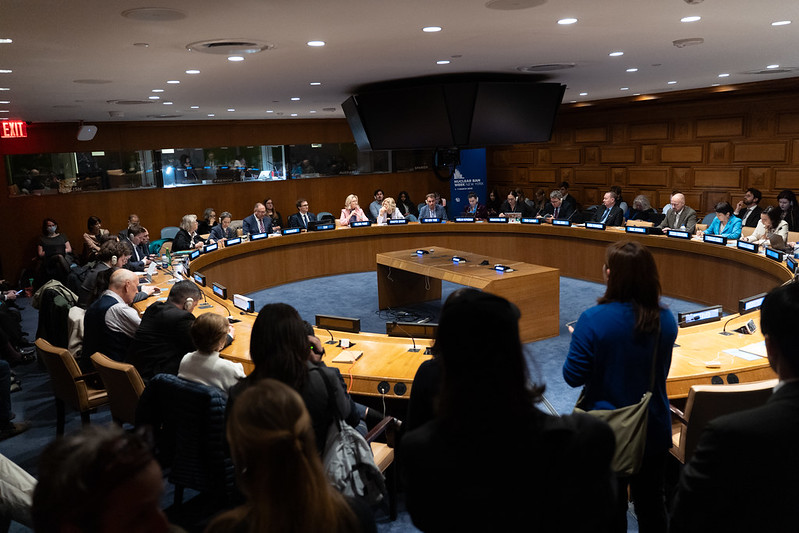"Parliamentarians for the TPNW" 2025
Third Meeting of the States Parties to the Treaty for the Prohibition of Nuclear Weapons (TPNW)
United Nations
New York, NY
March 3, 2025
The Simons Foundation Canada and the International Campaign to Abolish Nuclear Weapons (ICAN) co-convened the "Parliamentarians for the TPNW" Conference at the United Nations in New York during the Third Meeting of the States Parties to the Treaty for the Prohibition of Nuclear Weapons (TPNW). Parliamentarians from around the world gathered in New York alongside states parties, civil society representatives, and experts for a dedicated conference and reaffirmed the crucial role of legislators in advancing the treaty’s objectives and strengthening international efforts toward nuclear disarmament.
Click here for the Opening Remarks provided by Dr. Jennifer Allen Simons, Founder and President of The Simons Foundation Canada.
Statement to the 3rd Meeting of States Parties to the TPNW
Parliamentarians for TPNW
Esteemed colleagues,
As parliamentarians from across the world, we are united by a fundamental conviction: nuclear weapons have no more place in our collective future. We see the Treaty on the Prohibition of Nuclear Weapons (TPNW) as more than a legal instrument - it is a call to action, a roadmap to ending the gravest existential threat to humanity.
We extend our deepest congratulations to Nihon Hidankyo, the 2024 Nobel Peace Prize laureate, and to all survivors of the use of nuclear weapons. Their resilience, wisdom, and unwavering dedication including on educating younger generations must guide every discussion on nuclear weapons.
As parliamentarians, we have the responsibility to protect the people we represent. Nuclear weapons do not protect people. Their use would unleash catastrophic, uncontrollable devastation, overwhelming any humanitarian response and destabilizing global security. Even their mere existence fuels proliferation, heightens tensions, and increases the risk of miscalculation or accident.
We therefore cannot rely on nuclear deterrence as a security strategy. It would be a reckless gamble with humanity’s survival to base national security on a constant, credible threat of actual use of nuclear weapons. Threatening mass destruction runs counter to the security interests of humanity as a whole and renders nuclear deterrence as a dangerous, misguided and unacceptable approach to security.
Despite decades of legal commitments and political promises, nuclear-armed states insist that disarmament must wait for a “more stable world.” But humanity cannot afford to wait any longer.
The geopolitical reality underlines the importance of implementing and universalising the TPNW. Far from ensuring security, nuclear weapons put the world at increasing risk - from Russia's threats to use nuclear weapons in the context of the illegal invasion of Ukraine, to a minister of Israel suggesting to drop a nuclear bomb on the Gaza Strip, to threats of renewed nuclear testing, to expanded nuclear-sharing arrangements in Europe and the modernization of arsenals in every single nuclear-armed state. Loose rhetoric about “small” nuclear weapons and tactical use has lowered the threshold for nuclear war and brought us closer to catastrophe than at any time since the Cold War.
Yet, instead of addressing these risks, a small number of governments respond by doubling down—expanding their reliance on nuclear deterrence, issuing counter-threats, and pouring ever more resources into these weapons of mass destruction. Such a strategy is doomed to fail.
For, Humanity cannot coexist with inhumane weapons. And inhumanity must not be countered with more inhumanity. The response to nuclear violence must not be more nuclear violence. Darkness cannot drive out darkness, only light can do that. And it is those who have survived nuclear bombings and experimentations - those who still bear the scars of the nuclear weapons legacy - who continue to lead us towards that light.
As parliamentarians, we are committed to building support for the TPNW in every region of the world through our legislative work. My colleagues and I have introduced resolutions and motions to universalise the treaty and we join you, the states parties to the treaty, in the mission to expand membership, accelerate ratifications, and convince our governments to take action.
Through our crucial role in budgetary oversight and allocation, we commit to ensuring that adequate resources are directed towards implementing and universalising the TPNW. We will scrutinize military expenditure and advocate for redirecting funds from nuclear weapons programs to humanitarian needs, sustainable security measures and investment in the development and implementation of modern verification technologies.
80 years after the first development and testing of nuclear weapons and the bombings of Hiroshima and Nagasaki, we call on our parliamentary colleagues worldwide to sign the ICAN Parliamentary Pledge and join this mission. Nuclear weapons threaten us all. Working together as communities from all corners of the planet as governments, civil society and parliamentarians, we have banned nuclear weapons and we will eliminate them. END
